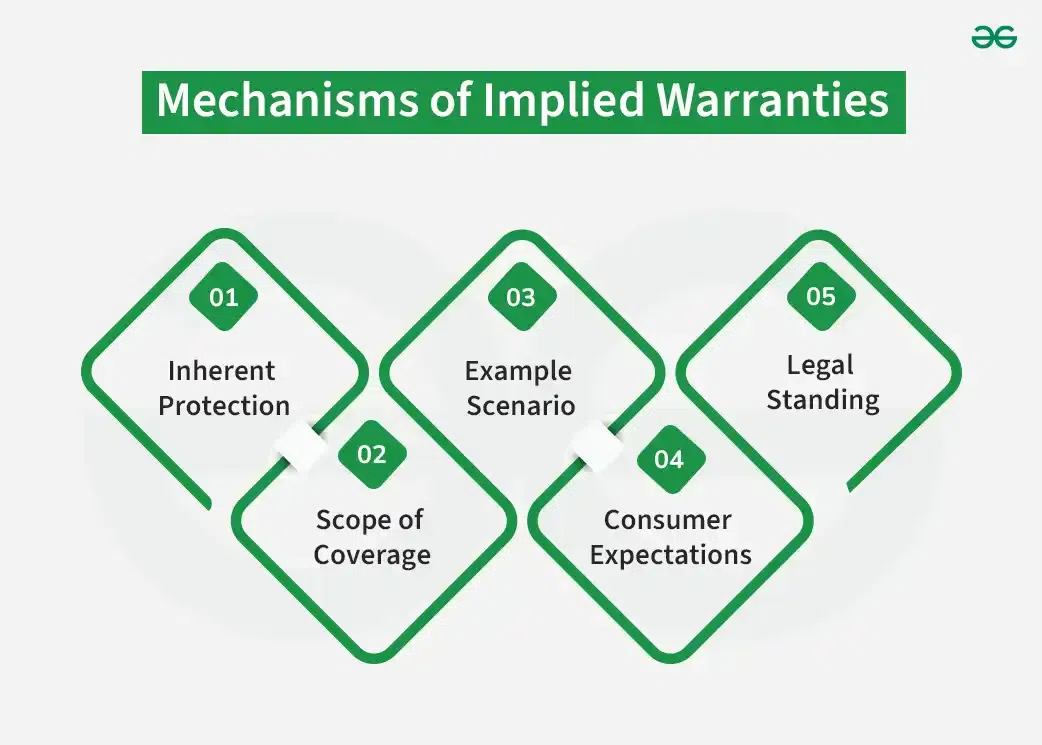
|
What is Implied Warranty?Implied warranty is the popular legal phrase used to guarantee that a product is merchantable, meets the expectations of an average buyer, and that the product is appropriate for the use for which it is desired. Unless specifically stated otherwise, or unless the product is marked “as is” or “with all faults,” the implicit warranty of merchantability. The presumption that a product will function as intended is known as an implied warranty. An implied warranty is an implicit guarantee that assures that a product will perform as intended. 
Table of Content Mechanisms of Implied Warranties1. Inherent Protection: Even in the absence of explicit guarantees, customers are safeguarded by implied warranties, ensuring the quality and legality of goods and services. 2. Scope of Coverage: Implied warranties encompass various aspects such as the assurance of workmanlike quality for services, the habitability of dwellings, and the rightful ownership (title) of products. These warranties complement any stated guarantees provided during the sale. 3. Example Scenario: Consider the purchase of apparently fresh fruit with hidden defects. Despite no explicit warranty, customers expect such goods to be of merchantable quality. If the fruit fails to meet this expectation, customers are entitled to remedies, like a refund. 4. Consumer Expectations: Implied Warranties extend beyond tangible products to include services and even the edibility and freshness of grocery items. Consumers inherently trust that goods from reputable sellers meet basic standards, reinforcing the need for implicit protection. 5. Legal Standing: Implied Warranties serve as a legal foundation, offering recourse for consumers in cases where purchased goods or services fall short of reasonable expectations, even without a written guarantee. Protection Laws for Implied Warranties
Types of Implied Warranties1. MerchantabilityThe items are merchantable and meet a reasonable buyer’s expectations, according to the implied warranty of merchantability. Mostly consumer goods have an implicit merchantability warranty. This guarantee is predicated on the idea that a product or thing functions as intended. It covers both brand-new and previously owned products. 2. FitnessA product is guaranteed to function for a certain purpose if it has a fitness warranty. The merchantability warranty is considered as a superior warranty as compared to this kind of implied warranty. For example, you can return an item under the implied warranty of fitness if you tell a salesperson you want a saw for cutting metal and it turns out not to cut through metal. When a good or product has a fitness warranty, it functions properly but falls short of the buyer’s expected purpose. A salesperson’s suggestion or guarantee of a product for a certain purpose implies a warranty of fitness. ConclusionIn the marketplace, implied guarantees provide customers with an essential layer of protection. They serve as tacit assurances that a product will perform as intended, even in the absence of a formal written warranty. Implied Warranties shield customers from obtaining subpar or worthless goods and guarantee a minimum standard of quality. In the event of a breach, this gives customers the ability to request repairs, replacements, or reimbursements. Even with some restrictions, such as seller disclaimers and the idea of “reasonable time,” implicit guarantees are nonetheless a potent instrument for protecting consumers, building confidence, and advancing a fair market. Frequently Asked Questions on Implied Warranties – FAQsIs it permissible for merchants to eliminate implicit warranties?
What occurs when an implied warranty is violated?
Is there any difference between Express Warranty from an Implied Warranty?
Which common types of warranties are there?
What is the duration of implied warranties?
Reference:
|
Reffered: https://www.geeksforgeeks.org
| Legal Studies |
Type: | Geek |
Category: | Coding |
Sub Category: | Tutorial |
Uploaded by: | Admin |
Views: | 13 |